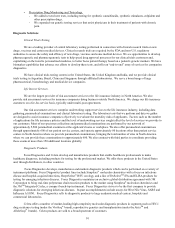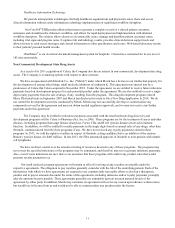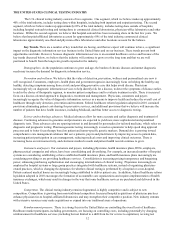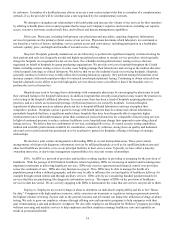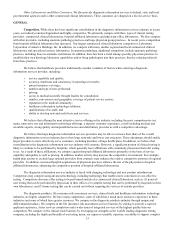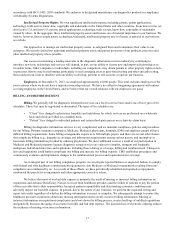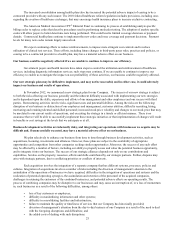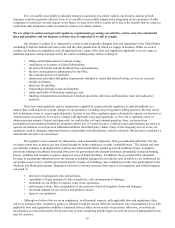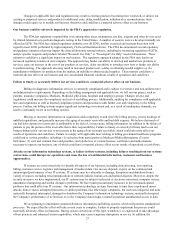Quest Diagnostics 2013 Annual Report Download - page 22
Download and view the complete annual report
Please find page 22 of the 2013 Quest Diagnostics annual report below. You can navigate through the pages in the report by either clicking on the pages listed below, or by using the keyword search tool below to find specific information within the annual report.
18
Government Coverage and Reimbursements. Government payers, such as Medicare and Medicaid, have taken steps
and can be expected to continue to take steps to control the cost, utilization and delivery of healthcare services, including
clinical test services. For example, Medicare has adopted policies under which it does not pay for many commonly ordered
clinical tests unless the ordering physician has provided an appropriate diagnosis code supporting the medical necessity of the
test. Physicians are required by law to provide diagnostic information when they order clinical tests for Medicare and Medicaid
patients.
With regard to the clinical testing services performed on behalf of Medicare beneficiaries, we must bill the Medicare
program directly and must accept the local Medicare carrier's fee schedule amount for covered services as payment in full. In
addition, state Medicaid programs are prohibited from paying more (and in most instances, pay significantly less) than
Medicare. Currently, Medicare does not require the beneficiary to pay a co-payment for diagnostic information services
reimbursed under the Clinical Laboratory Fee Schedule, but generally does require a patient deductible for anatomic pathology
services. Certain Medicaid programs require Medicaid recipients to pay co-payment amounts for diagnostic information
services.
Part B of the Medicare program contains fee schedule payment methodologies for clinical testing services performed
for covered patients, including a national ceiling on the amount that carriers could pay under their local Medicare clinical
testing fee schedules. The Medicare Clinical Laboratory Fee Schedule for 2014 is decreased by .75% from 2013 levels. In
addition, reimbursement under the Medicare Clinical Laboratory Fee Schedule continues to be reduced by 2% as a result of
federal government sequestration. CMS implemented changes in the Medicare Physician Fee Schedule effective January 1,
2014 that are expected to reduce reimbursement for tissue biopsy, immunohistochemistry and other services. In December
2013, Congress delayed by three months a potential decrease of approximately 24% in the Medicare Physician Fee Schedule
that otherwise would have become effective on January 1, 2014. The following table sets forth the percentage of our
consolidated net revenues reimbursed under Medicare attributable to the clinical testing and physician fee schedules in 2013.
Medicare Part B
Reimbursements
% of our
2013 Consolidated
Net Revenues
Clinical Laboratory Fee Schedule 12%
Physician Fee Schedule 2%
Penalties for violations of laws relating to billing government healthcare programs and for violations of federal and
state fraud and abuse laws include: (1) exclusion from participation in Medicare/Medicaid programs; (2) asset forfeitures; (3)
civil and criminal fines and penalties; and (4) the loss of various licenses, certificates and authorizations necessary to operate
our business. Civil monetary penalties for a wide range of violations may be assessed on a per violation basis. A parallel civil
remedy under the federal False Claims Act provides for penalties on a per violation basis, plus damages of up to three times the
amount claimed.
Historically, most Medicare and Medicaid beneficiaries were covered under the traditional Medicare and Medicaid
programs administered by the federal government. Reimbursement from traditional Medicare and Medicaid programs
represented approximately 18% of our consolidated net revenues during 2013. Over the last several years, the federal
government has continued to expand its contracts with private health insurance plans for Medicare beneficiaries and has
encouraged such beneficiaries to switch from the traditional programs to the private programs, called “Medicare Advantage”
programs. There has been growth of health insurance providers offering Medicare Advantage programs and of beneficiary
enrollment in these programs. In recent years, in an effort to control costs, states also have mandated that Medicaid
beneficiaries enroll in private managed care arrangements.
REGULATION
Our businesses are subject to or impacted by extensive and frequently changing laws and regulations in the United
States (at both the federal and state levels) and the other jurisdictions in which we conduct business. These laws and regulations
include regulations particular to our business, and laws and regulations relating to conducting business generally (e.g., export
controls laws, U.S. Foreign Corrupt Practices Act and similar laws of other jurisdictions), including in the United States and in
other jurisdictions. We also are subject to inspections and audits by governmental agencies. Set forth below are highlights of the
key regulatory schemes applicable to our businesses.




